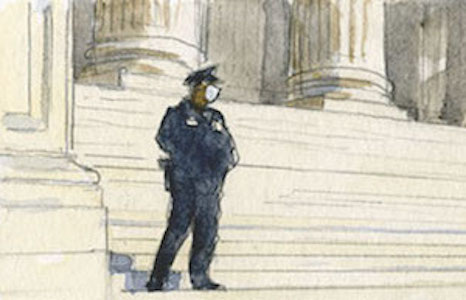Wednesday round-up

For The Washington Post (subscription required), Mark Berman reports that Missouri on Tuesday carried out the countrys first execution amid thecoronavirus pandemic, not long after the U.S. Supreme Court rejected a request to stop the lethal injection. Katie Bart reports on the justices order denying Walter Bartons request for a stay of execution for this blog. At Fox News, Shannon Bream and Bill Mears report that [o]ther states, including Ohio, Tennessee and Texas, havepostponed executionsafter attorneys argued that pandemic-related closures prevented them from securing records or conducting interviews for clemency petitions and court appeals.
For this blog, Adam Feldman uses data from the first week of the Supreme Courts telephonic oral arguments to compare old-style oral arguments with the new framework; he concludes that [t]he change in argument format offers an interesting lens into potential improvements for oral arguments moving forward.” In an article accessible at SSRN, Leah Litman analyzes speaking time during the recent telephonic Supreme Court arguments, noting that [s]eventy-five percent of the twelve longest questioning periods were from male Justices (who make up 67% of the Court), all of them conservative.
Briefly:
- For The Wall Street Journal (subscription required), Jess Bravin and Jessica Donati report that [t]he Trump administration is nearing a deal with Sudan to resolve claims over al Qaedas 1998 bombings of U.S. embassies in Africa, helping clear the way to remove Khartoums designation as a state sponsor of terrorism; [o]n Monday, the Supreme Court unanimously rejected Sudans bid to delete $4.3 billion in punitive damages from a $10.2 billion verdict victims won against Khartoum in federal court, but the odds of collecting on that judgment are steep, making a U.S.-negotiated settlement the most plausible way that victims would see any compensation.
- For this blog, Steve Wermeil looks at some of the COVID-19-related cases on the Supreme Courts docket, which have covered a broad array of important rights and liberties, from voting practices to abortion services to immigration issues to prison conditions.
- At The Employment Law Group, R. Scott Oswald suggests that [a] reasonable compromise in Our Lady of Guadalupe School v. Morrissey-Berru, which involves the scope of the ministerial exception to federal employment discrimination laws, might limit the categorical exception ofHosanna-Taborto cases involving spiritual leaders, while applying Justice Alitos narrower, doctrine-based exception to certain other employees within a religious organization.
We relyon our readers to send us links for our round-up.If you have or know of a recent (published in the last two or three days) article, post, podcast or op-ed relating to the Supreme Court that youd like us to consider for inclusion in the round-up, please send it to roundup [at] scotusblog.com. Thank you!
Posted in Round-up
